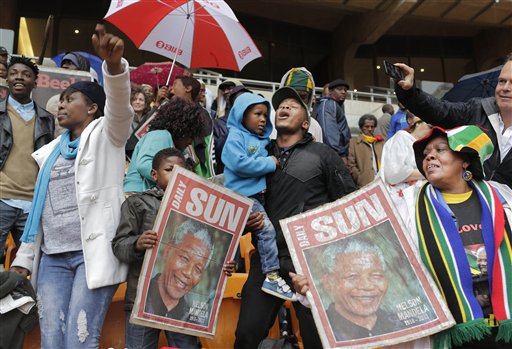The editor of the Cape Times, the leading English-language morning paper in the South African coastal city of Cape Town, has been fired after declining to lead last Friday’s coverage with the story of the death of Nelson Mandela, the country’s first black president and also its first fully democratically-elected leader. Instead, the editor, Alide Dasnois, led with a story of government corruption involving the newspaper’s holding company.
The Cape Times is part of the Independent Media consortium, which owns many South African newspapers. That group, in turn, was recently bought by Sekunjalo, a company closely connected with the government and which was founded as a “black economic empowerment” company, one that seeks to increase black ownership and investment in the South African economy, in part to redress the injustice of past discrimination. Black economic empowerment companies have often been criticized for enriching a small class of political cronies.
Sekunjalo was recently embroiled in a corruption scandal involving a contract it received improperly to patrol South African fisheries. The company was cleared by an official investigation that found fault instead with government officials. Seknujalo has defended its reputation aggressively, and has filed criminal charges against at least one journalist who wrote about the story for the Sunday Times, which is part of the Independent group.
Following news last week that Dasnois had been fired, the South African National Editors’ Forum and Cape Town Press Club raised the question of whether she had been dismissed for running a negative story about Sekunjalo. But Sekunjalo chair Iqbal Survé said she had been fired for not leading with the Mandela story.
In a year-end letter to employees, Survé wrote about Mandela (using his familiar clan name, “Madiba”):
On Thursday evening, on being informed about Madiba, the editorial leadership and management present in Cape Town planned that the group’s titles would dedicate the editorial to Madiba for the next morning’s publications. All editorial teams were encouraged to immediately leave the strategic session for their newsrooms to ensure that the news focus for the following day would be on Madiba and to communicate the plan nationally to the group’s newsrooms.
There was excitement that Independent would have a uniform editorial position on the front and leading pages of all its major publications on Friday. This would give our readers the opportunity to learn first-hand information of what had transpired during Madiba’s last few hours with family and close friends but more importantly to celebrate the magnificent legacy Madiba left for all of us.
It therefore goes without saying that on Friday, the senior executives of INMSA were shocked to discover that the only major Independent title that failed to lead editorially with Madiba’ passing was the Cape Times….
It is my considered view, and that of the senior executive team of Independent present at the time with Ms Dasnois, that the failure of the Cape Times to lead with such a momentous event, was an affront to the dignity of Madiba and a disservice to our readers.
The Cape Times subsequently produced a fitting tribute to Madiba this week. I wish to thank all of the members of the Cape Town newsroom for their professionalism from Sunday evening in producing an outstanding newspaper.
Under its new, post-apartheid constitution, South Africa enjoys a free and vigorous press. However, press freedom is considered threatened by new media regulations, as well as by the dominance of the public broadcasting authority, which leans heavily toward the ruling party’s political line. The consolidation of media ownership under politically-oriented companies such as Sekunjalo is also considered a serious challenge.

COMMENTS
Please let us know if you're having issues with commenting.